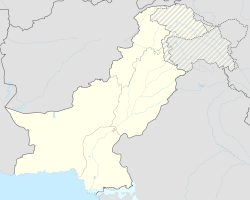Sialkot
|
Sialkot سیالکوٹ |
||
| State : |
|
|
| Province : | Punjab | |
| Coordinates : |
32 ° 30 ' N , 74 ° 32' E
|
|
| Height : | 256 m | |
| Area : |
3 016 km²
|
|
| Residents : | 655,852 (2017 census) | |
| Population density : | 217 inhabitants per km² | |
| Time zone : | PST ( UTC + 5 ) | |
| Telephone code : | (+92) 052 | |
| Postal code : | 51310
|
|
| Nazim ( Mayor ) : | Ch Omer Bhali | |
|
|
||
Sialkot is an old industrial city in northeast Pakistan in the populous province of Punjab , not far from the border with India . Sialkot has 655,852 inhabitants (2017). The ancient place Sakala is often identified with Sialkot .
climate
Sialkot is 251 m above sea level . The average amount of precipitation per year is 950 mm, with over 500 mm of precipitation falling in the two months of July and August alone. The average temperature is 22.7 ° C. The highest temperatures of over 40 ° C are recorded in Sialkot in May and June, but the months of July and August are also above 29 ° C. From December to February the average temperature is 12 ° C.
Population development
| Census year | population |
|---|---|
| 1972 | 203,650 |
| 1981 | 301,609 |
| 1998 | 417,597 |
| 2017 | 655.852 |
economy
Sialkot is known for two major export industries worldwide: medical technology (surgical instruments) and sporting goods .
surgical instruments
Based on an independent handicraft tradition in forging daggers, the further development began with small beginnings: the repair work for a local mission hospital. Since the 1970s, direct investments in medical technology companies from Tuttlingen have led to numerous joint ventures in Sialkot. Today there is the world's second largest cluster for surgical instruments with 2,200 (mostly small) companies and 30,000 employees.
Sporting goods
The beginnings of this branch lie in the repair of sporting goods for the British soldiers stationed here at the end of the 19th century. Later local workshops went over to also making the sporting goods themselves.
In the 1970s, local companies were able to secure the contract for the World Cup ball " Tango ", so that football production soon played an important economic role for the city and from then on the city developed into a center for the sporting goods industry. Today about 75% of the world's soccer ball production comes from Sialkot. In the years of the soccer World Cup, this means a production volume of 40 million soccer balls per year. However, the soccer balls for the 2006 World Cup were not made in Pakistan because the prices in Sialkot were too expensive. The contracts went to Thai companies.
A total of 247 different sporting goods are manufactured. For example, high-quality hockey and cricket sticks from Sialkot are used at games around the world. They are produced by around 10,000 mostly small and very small companies in the Sialkot district with a total of around 100,000 employees (14% of the workforce).
Well-known products from Sialkot are:
- Motorcycle clothing
- other leather goods such as lederhosen , leather jackets, leather shoes, leather bags etc.
architecture
In addition to examples of British colonial architecture, Sialkot has several historically significant buildings. One of the most famous buildings is the house where the writer Allama Iqbal was born. In the city center, on a hill that may have been inhabited 5000 years ago, is the Sialkot Fort, which was founded in the 2nd century and which has been rebuilt and expanded several times and of which brick walls and a round tower have been preserved. In the middle of the fort a small green area was built, in which a tank captured in border disputes with India in 1965 was set up and on which there is an administration building, which is considered to be Sialkot's landmark. The train station, the Holy Trinity Cathedral, completed in 1852, and the clock tower, built around 1800, date from the British colonial era.
Personalities from Sialkot
- Faiz Ahmed Faiz (1911-1984), Urdu poet
- Gulzarilal Nanda (1898–1998), Indian politician
- Madan Lal Puri (* 1929), Indian mathematician
- Muhammad Iqbal (1877–1938), Urdu poet
- Muhammad Zafrullah Khan (1893–1985), Pakistani politician
See also
Individual evidence
literature
- Halder, Gerhard (2005): Surgical instruments from Tuttlingen and Sialkot / Pakistan. Local production for the world market. In: Geographische Rundschau 57, issue 2, pp. 12-20.
- Zimmermann, Jörg (2005): Pakistan's football industry and the world sporting goods market. In: Geographische Rundschau 57, issue 2, pp. 22-29.




